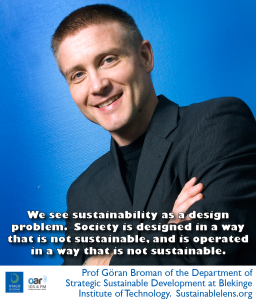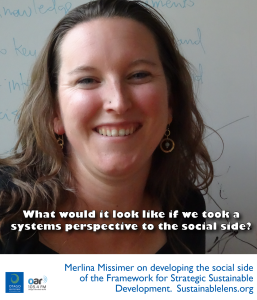
You would be very unlikely to win a game of chess without knowing the principled definition of checkmate. Reaching a sustainable society without any idea of the principles that define that situation would also be very unlikely.
Prof Göran Broman heads the Department of Strategic Sustainable Development at Blekinge Institute of Technology in Karlskrona, Sweden.
This conversation is one of a series of four recorded at Blekinge Institute of Technology Department of Strategic Sustainable Development in September 2014.
Talking points
Developing tools to support strategic sustainable thinking
It is important that we develop tools with the community, the type of people who will be using them or they will be useless.
How organisations can support the whole of society towards sustainability, and how can they do that in a way that strengthens their own organisation – that is the being strategic.
If an organisation does something for sustainability of society, that is good, but if the company goes bankrupt doing that then it’s not that good because they can’t continue to contribute, and they become a bad example…then other companies will be hesitant to work proactively with sustainability and that will slow down the progress of society towards sustainability.
It is really important that organisations that work towards sustainability are successful in the short term, because that will help the transition.
Strategic sustainability is about developing methodologies to help organisations bring together those seemingly hard to match aspects – the short term with the long term, the small scale perspective with the big perspective, the self interest profitability with ethics, and so on.
A framework for strategic sustainability, tools supporting the whole of society in a way that strengthens your own organisation.
Having a long term perspective, a vision of where you want to far into the future when the whole of society is sustainable, how is your organisation supporting that, fulfilling the needs or the wants of the customers within the frame of a sustainable society in the future. From that, look back to today’s situation, how does that differ? What are you doing today that contributes to unsustainability?
Once the companies have created that vision, we put that vision inside the frame of the definition of sustainability – because is is really stupid to have a vision that cannot exist in the future.
In what way is the company today contributing to sustainability and unsustainability.
It is possible to avoid the apparent contribution of short term profitability and long term societal sustainability.
It is difficult to describe a product, a person, a company today is sustainable since the whole of society is unsustainable, or on an unsustainable track, whatever you do contributes to that unsustainability. But you can say that a product can be designed, or a company can be run in a way that contributes to sustainability – contributes to the transition from today’s unsustainable situation to the sustainable situation, that you can say.
Only when we have reached the situation when the whole of society is sustainable, and everything within it…then you can say a company or product is sustainable, but today you can not. We are unfortunately very far from that situation.
It’s impossible, or at least very hard, and not very wise, to define in detail what a sustainable society should look like. We won’t get everyone to agree on detail…another reason is that so many things will change during the transition that we cannot predict… So we have been trying to find a principled definition of sustainability.
The principled definition of strategic sustainability can be described using a chess metaphor. In chess you also have a principled definition of the goal, how do you define success – you put your opponent in checkmate. Checkmate is not defined in a detailed way…it is a principled definition – it says that the king must be threatened, the king must not be able to move away from the threat, you should not be able to put a piece in front of the king to protect him and you should not be able to strike out the threat. If those principles are fulfilled then it’s checkmate. It can look in an almost infinite number of ways…when you start to play a game of chess you don’t know exactly how it will end. That definition is used all the time by the chess player…first you learn the basic rules and how to play the game (the A step)…then he or she assesses the current situation, where are my pieces, my opponents pieces and so on (the B step), then work up a number of ways you can move ahead (the C step) and there are huge amount of possibilities, and the (D step) what smart early moves should I start with? And you assess those moves through the lens of the definition of checkmate because that’s what you want to reach. Once you’ve made a couple of moves you reassess the situation, because the opponent has moved his or her pieces in a way you could not predict in detail. You move and reassess. All the time the player has the definition of checkmate.
You would be very unlikely to win a game of chess without knowing the principled definition of checkmate. Reaching a sustainable society without any idea of the principles that define that situation would also be very unlikely.
We are defining and continually refining strategic sustainability principles that correspond to checkmate.
Our principles are based on defining an ecological and socially sustainable society…people ask why not economics? …but that is not included in the goal, because economics is not the goal – it is means for reaching the goal.
We have a systematic increase of fossil carbon, captured in carbon dioxide, that is increasing. That cannot continue, we cannot have higher and higher concentrations all the time, because eventually we will reach a tipping point, or critical limit where the system will collapse. We don’t know exactly where that limit is, but we don’t need to know exactly.
If we run the society the way that we will have as an unavoidable outcome a systematic increase of substances, then it is unsustainable. We don’t have to know exactly when it collapses, but it will, and the design as such is unsustainable.
Of course it is of value to try to find out the critical limits of substances, but it is also hard, so we should not put all of our efforts in society, in research to find where exactly where those critical limits are, it’s hard and we’ll never succeed…when we know that if society is designed in such a way that will result in us approaching those limits, it’s unsustainable.
In a sustainable society, nature is not subject to increases in systematic degradation by physical means – mismanagement of land, capacity of ecosystem….
We are currently working on elaborating the social dimension.
(chess metaphor, not overlord) importance of self benefit of companies…society is on a non-sustainable route…it is becoming more and more difficult for companies to do things that continue to contribute to unsustainability.
We need to change the system we have from within, we have no other option. People that have realised where we need to be on a principled level need to strike that balance, by moving ahead as fast as fast as possible, not faster or slower. This being strategic and is not easy. It’s not easy to play chess just because you know the definition of checkmate.
(But do we know the know the rules of sustainability?) We know some rules, we know the scientific laws for example, they apply regardless of politics. Then there are rules that might change – politically decided laws and regulations might change during the process. So we have a mix of rules.
(can we see the whole board? some things are unseeable, there are things we don’t understand and won’t understand) We can see the whole board depending on resolution, in a very concrete term the first astronauts saw the earth from outside. Then at a more refined level of resolution, a single organisation might not see it everyday, but they can relate to that full picture.
All the things I have done in sustainability come from childhood. When I was kid, my parents were engaged in sustainability. Especially my father, he was chairman of a local environmental association.
I chose…engineering so I could design a problem out of a system.
We see sustainability as a design problem. Society is designed in a way that is not sustainable, and operated on a basic level that is not sustainable.
I decided to go for engineering as my formal education…I thought it would be easier to change the system if I had that credibility.
(Activist?) Yes. I act to create change.
(Challenges) Huge challenge in academia of compartmentalisation. People doing research and people doing academic education are divided into disciplines – which is not bad in itself and we need more and more detailed knowledge in specific fields – but not if we do that instead, or only. If we don’t have some people doing a structured overview. How can you bring together all that wonderful knowledge?
How can you combine all that knowledge in the best way relation to the sustainability challenge that we have? That is, by nature, interdisciplinary academic research. That is problematic, because when academic groups are evaluated, they are evaluated from the disciplinary point of view. It is hard for interdisciplinary groups to get fair evaluations.
(Miracle) One of the first things would be to have every person in the world be knowledgeable about how to reach strategic sustainability.
We have the physical resources, we have energy coming from the sun that would be sufficient to keep all of humanity in very good living standards, if we do it in the right way we have enough food, and so on…so it’s about managing this in a sustainable way, and that takes knowledge and competence.
(Advice) Try learn about those things and try to do what you can. Many people think “this is so daunting, so huge, so what I do as a little person is meaningless if I do something the system is so big and unsustainable it will collapse anyhow” but it’s not, try to do what you can. If every person does what he or she can, then we are a good part of the way.
Don’t be scared off, do what you can do. If every person does what he or she can do, then we will move our position forward, and then it will be apparent to those people that we can change things.


